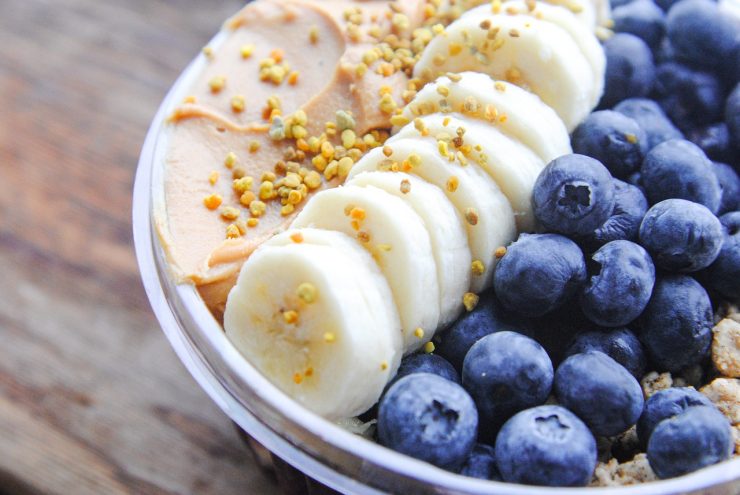Acai (pronounced Ah-sa-EEE) first appeared in health food stores a few years ago, and I figured it was just another trendy superfood that would fade away. So, I didn’t pay much attention to it.
Lately, though, I’ve been seeing “Acai bowls” popping up at coffee and smoothie shops. It wasn’t until my son’s girlfriend raved about how tasty they were that I decided to give one a try. Now, I’m completely hooked on the acai bowl I get from my local coffee shop. It’s seriously delicious!
Acai comes from a type of palm tree that grows in the rainforests of South and Central America. The fruit is small, about an inch in diameter, with a single pit, which technically makes it a drupe (not a berry, despite what they’re often called).
For centuries, acai has been a major source of nutrition for many indigenous tribes in Brazil and the Amazon. With its impressive nutrient profile, it’s easy to see why.
The fruit’s deep purplish-red color is a good hint at its health benefits. Acai is packed with antioxidants, low in calories and sugar, and high in fiber. The dark purple color signals high levels of anthocyanins, a potent antioxidant also found in blueberries, cranberries, and dark grapes.
Most of acai’s health benefits come from its high antioxidant content. It has one of the highest ORAC scores (Oxygen Radical Absorbance Capacity) of any fruit. In case you’re wondering, ORAC measures how many antioxidants are in foods. Acai even outperforms goji berries and blueberries in this area!
Acai also contains powerful antioxidants like anthocyanins, proanthocyanidins, and epicatechin, along with vitamins A, C, and E. On top of that, it has healthy fats like monounsaturated fatty acids and omega-3s, as well as plant sterols. These antioxidants help with everything from skin health to fighting cancer, supporting heart health, aiding in weight loss, and much more.
Let’s take a closer look at these benefits:
Skin Health
Acai is loaded with antioxidants—about 10 times more than red grapes, and 10 to 30 times more anthocyanins than red wine. If you’re sipping wine for its antioxidants, maybe it’s time to try acai instead.
The antioxidants in acai are fantastic for your skin. They help combat the aging effects of oxidation caused by sun exposure, stress, pollution, alcohol, and poor diet. By protecting skin cell DNA, acai may reduce the risk of cancer. Plus, it can help reduce fine lines, wrinkles, and improve skin cell turnover. Acai’s antioxidants also boost nutrient absorption in skin cells and support collagen production, helping to fight wrinkles. The anti-inflammatory properties also help with acne and skin redness.
Fights Cancer
Because of its antioxidants, acai helps protect cells from damage and promotes the growth of healthy cells, making it a good candidate in the fight against cancer. Research has shown that acai may:
-
Prevent cancer cell growth
-
Induce cancer cell death
-
Have anti-inflammatory effects
-
Protect healthy cell reproduction
-
Inhibit the development of new tumors
There have been studies in animals and lab settings suggesting acai’s potential in fighting cancer, especially bladder, breast, and colon cancers. One study even showed a dramatic 82% reduction in tumor size for mice with malignant melanoma. These studies are promising, and more research on acai’s cancer-fighting properties in humans is definitely needed.
Helps Control Hunger and Aids in Weight Loss
Some experts believe acai may help control hunger by balancing blood sugar levels. When blood sugar rises after eating sweet or starchy foods, insulin is released, which signals fat storage and triggers feelings of hunger. Acai may help regulate insulin release, keeping you fuller longer. It’s also high in fiber, which supports digestion and keeps things moving—helping to avoid bloating and gas.
But, be cautious with acai bowls and smoothies, as they often include added sugars from other fruits, juices, and toppings that can counteract acai’s appetite-suppressing effects.
Helps Detox the Body
Acai’s fiber content is great for digestion and gut health. It helps cleanse the colon and supports the growth of beneficial probiotics. Acai is often promoted in detox cleanses for its ability to support liver and kidney health.
The fiber helps eliminate harmful residues from processed foods and undigested matter in the colon, preventing these toxins from leaking into the body and causing inflammation. Regular consumption can also help prevent constipation and improve overall regularity. While some detox products claim rapid weight loss, keep in mind that extreme claims (like losing 20 pounds in a week) aren’t backed by science and aren’t healthy.
In my view, your body naturally detoxes when you eat whole, natural foods, but cleanses can be useful for people who’ve been eating unhealthy and want to reset their system.
Slows Mental Decline
With age-related brain diseases like Alzheimer’s and Parkinson’s on the rise, scientists are investigating how inflammation and oxidative stress contribute to these conditions. Antioxidants like those found in acai—especially anthocyanins—may help reduce oxidative stress and lower inflammation, promoting better brain health.
A study showed that increasing polyphenol antioxidants significantly lowered the risk of dementia in older adults. Anthocyanins also improve memory and cognitive function by reducing brain inflammation and enhancing blood flow to the brain.
How to Consume Acai
Fresh acai is tough to find unless you live near its native regions in South America because it spoils quickly. Fortunately, acai is available in frozen, freeze-dried, powdered, or juiced forms. I personally love the frozen pulp, which is perfect for smoothies or bowls.
Just keep in mind that some acai bowls at restaurants can be packed with added sugars, so make sure to check the ingredients if you’re watching your sugar intake.
All in all, acai is not just another fad—it’s packed with health benefits that make it worth incorporating into your diet!











